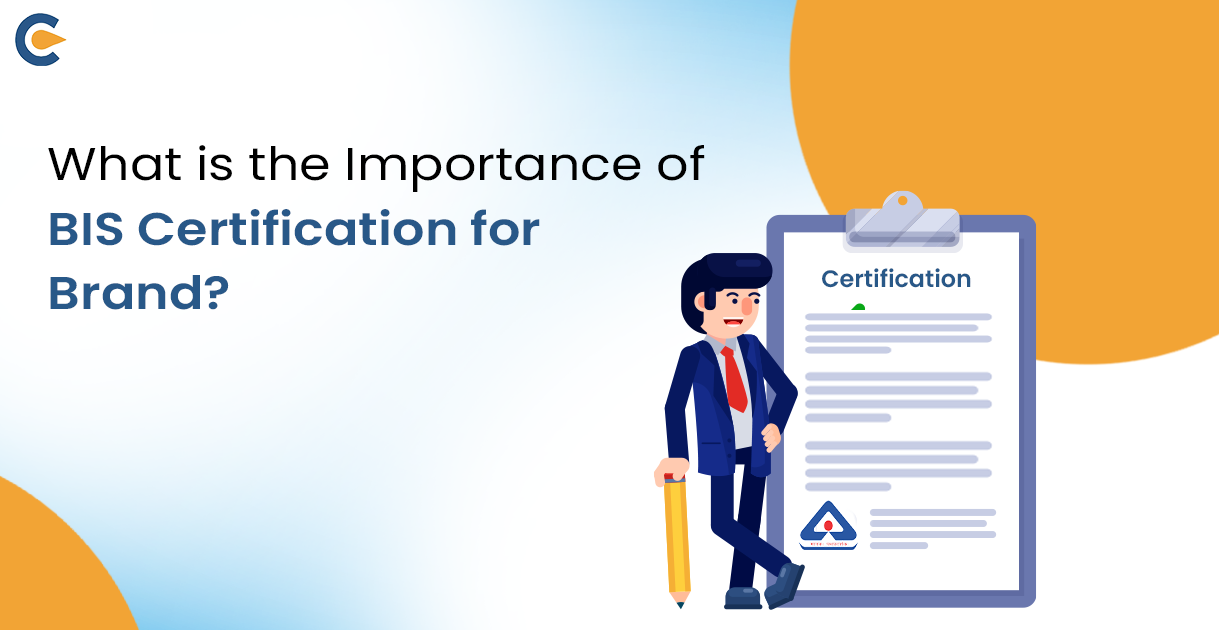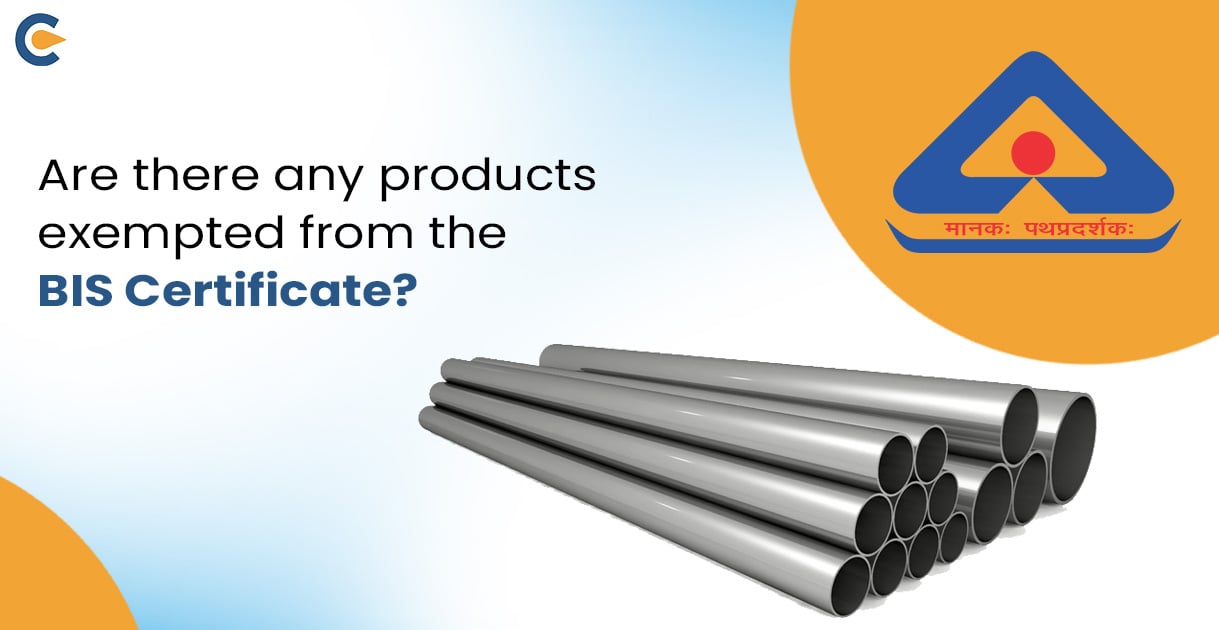Under the Government of India’s Ministry of Consumer Affairs, Food, and Public Distribution, the Bureau of Indian Standards (BIS) is a statutory entity. It was founded in 1986 with the goal of creating and advancing product standards that guarantee dependability, quality, and safety. In India, BIS is in charge of creating and enforcing standards for product safety and quality. Its main goal is to safeguard consumer interests while ensuring the production and delivery of high-quality goods and services.
BIS Certification for Brand: Overview
In India, a conformity assessment program mandated by the Bureau of Indian Standards (BIS) certifies the safety and quality of products. It serves as a badge of conformity with Indian standards, enhancing customer safety and obstructing the sale of inferior products. It must undergo thorough testing and assessment in accordance with BIS-established criteria as part of the certification procedure.
In order to receive BIS certification for the brand, brands must send their goods to approved testing facilities for evaluation. Performance, reliability, and safety are some of the factors that these facilities consider. When the products meet all the standards, the brand is certified by BIS and can then put the BIS symbol on their products.
What do you mean by BIS Certification?
The Bureau of Indian Standards certifies a brand as high-quality, trustworthy, and safe for consumers to use. This is known as BIS certification. BIS is an Indian government organization that supervises and promotes industry and product standards. The BIS utilizes eight central laboratories, four branch laboratories, and four local laboratories to assess product samples during preliminary and monitoring operations. The BIS is involved in several activities, including testing, hallmarking, calibration systems, standard creation, and product certification.
Importance of BIS Certification for Brand
The BIS certification for the brand is very important compliance for the brand owner. Following are some of the importance of acquiring a BIS certification for a brand:
- Ensuring Safety and Quality:
BIS certification for the brand guarantees the goods’ safety and quality by assuring customers that they comply with the relevant Indian requirements. It offers a seal of approval that motivates customers to make wise decisions when making purchases.
- Regulatory Compliance with regulations:
Government rules need BIS Certification for brands for a number of items. In order to legally operate in the Indian market, importers and producers must get a BIS certification and adhere to BIS requirements.
- Export Facilitation:
Indian products can be exported to foreign markets more easily owing to the global recognition of BIS certification for brands. It guarantees that the goods fulfil legal and international quality standards.
- Risk Mitigation:
BIS Certification assists companies in reducing the risk of product quality non-compliance, which could result in fines, recalls, or damage to their reputation.
- Competitive Benefit:
By differentiating certified items from non-certified ones, BIS Certification offers an advantage over non-certified rivals. Products that have earned a BIS certification are more marketed because buyers view them as trustworthy and high-quality.
- Client Confidence:
BIS certification for brands promotes brand loyalty and consumer confidence in a market full of various products. Because the BIS logo is associated with quality assurance, consumers are more likely to trust items bearing this mark.
Which Brand Manufacturer needs BIS Certification?
For a wide range of firms, both international and local, to sell their products in the Indian market, BIS Registration is required. The product categories listed under the Compulsory Registration Scheme (CRS) primarily dictate the kinds of companies that are required to get a BIS Registration. Following need for the BIS certification for the brand:
- Domestic Manufacturers:
If an Indian manufacturer’s product fits into one of the CRS’s categories and it is produced domestically, it must first seek a BIS Registration. This guarantees that prior to being delivered to customers, the items fulfil all applicable quality and safety guidelines.
- Foreign Manufacturers:
If their products are mentioned in the CRS, foreign manufacturers that want to export to India must also apply for BIS Registration. For international producers to enter the Indian market, this is an essential step. It guarantees that goods imported into India adhere to the same safety and quality requirements as goods made in the country.
- Existing Manufacturers:
Current manufacturers must apply for a new BIS Registration if they want to sell their goods under a different name or from a different location. This is so that a specific manufacturer may be awarded a BIS certificate for a product that is made in a specific location under a specific brand. A fresh application for BIS Registration is necessary in the event that any of these elements manufacturer, the manufacturing location, the product, or the brand- change.
Requirement for BIS Certification for Brand
The prerequisites stated below are necessary to receive a BIS certification for the brand:
- The product has to fulfil the requirements of the Indian Standard Specification.
- Distributors and retailers do not receive a BIS license; only factories that create completed goods are granted one.
- A company must submit a separate application for every good and factory site if the manufacturer has many factories, each of which is situated at a different geographic address.
- The laboratory needs to be well furnished with apparatus for testing products and staff who are qualified to ensure that the product is tested in compliance with the relevant ISS.
- In accordance with the relevant SIT and ISS regulations, all manufacturing equipment and testing facilities must be situated on the manufacturing facility grounds.
- Every step of the process, from receiving raw materials to final packing, should be finished in the same plant. Should any outsourcing be necessary, the Bureau’s approval might be asked for.
- “Product Manuals” with the technical specifications are accessible for any product covered by the Product Certification Scheme. Sampling guidelines, a list of test instruments, a Scheme of Inspection and Testing (SIT), a scope description, and other information are included in product manuals.
- To reduce the likelihood of rejection, the applicant can use this Product Manual for BIS ISI Certification to be ready for the audit and application submission.
BIS Certification for Brand: Crucial Documents Required
The following are the documents that are required for BIS certification for a brand. It is very crucial to submit all the documents mentioned in the procedure and in the application form for BIS certification for the brand.
- The manufacturing unit’s business license (translated into English plus the local language)
- The business license’s scope (both in the local language and translated into English).
- The manufacturer’s ISO certificate
- A letter of authorization (if the signatory is not the manufacturing facility’s head)
- Certificate of Trademark
- A letter of trademark authorization in the event that the producer does not own the brand
- The nomination letter of AIR
- Documents for Testing (Completed CDF and CCL)
- The device’s product manual or technical specification sheet
Process of BIS Certification for Brand
There are four steps involved in getting a BIS certification for the brand from the Bureau of Indian Standards:
Step 1: Filling out the application and documentation
In accordance with BIS certification for the brand, candidates must submit an online application for BIS registration through the portal and supply all requested documentation along with the necessary payment.
Step 2: BIS authority’s preliminary inspection
An office will visit the production facility to conduct a preliminary inspection and verification after the application has been properly submitted.
Step 3: Conducting product or sample testing
Following completion of the production unit’s preliminary inspection or survey, the officer will remove a sample of the product and send it to separate labs for testing. A performance evaluation report will be created for the next step of the procedure after the BIS licensing authority is satisfied with the test results.
Step 4: BIS certification and marking are issued
The licensing authority will examine the report following the conclusion of the inspection and testing and make decisions based on it. The applicants will receive the BIS certificate.
Benefits of obtaining BIS Certification for Brand
The BIS certification for the brand has a number of benefits.
- Enforcing manufacturers to follow particular criteria during the production process in order to guarantee quality requirements
- Products with the BIS certification are acknowledged for their outstanding reliability and performance, which adds to their credibility.
- By prohibiting the use of specific hazardous chemicals and materials, BIS’s stipulated standards have reduced environmental hazards.
- BIS certification is only given following extensive quality inspections and stringent testing of product samples in labs that have been certified by BIS.
Conclusion
As you are probably aware, in order to continue exporting and selling their products in the Indian market, producers are required by a number of regulations to secure a BIS certification for the brand. You could require clarification on the procedure if this is your first time obtaining your BIS certification for the brand. For this reason, it is advisable to seek professional guidance and assistance so that they can manage the entire procedure and help you receive a BIS certification for the brand.
Frequently Asked Questions
Manufacturers of electronic devices are authorized by the BIS to apply or use the standard mark with a distinct R-number.
The goods covered by quality control orders must meet Indian Standards, which need a BIS license or compulsory registration in order to import goods into India.
Under the auspices of the Indian Ministry of Consumer Affairs, Food & Public Distribution, the Bureau of Indian Standards (BIS) serves as the country’s official certifying authority.
Being one of the founding members of ISO, BIS actively participates in the creation of international standards by serving on a number of technical committees, subcommittees, working groups, etc., as a Participating (P) or Observer (O) member.
The BIS Hallmark is a certification method for the pure metal used in gold and silver jewellery supplied in India. It attests to the jewellery item’s compliance with standards established by India’s national standards body, the Bureau of Indian Standards.
The Food Safety and Standards Authority of India, or FSSAI, grants licenses to companies involved in the food industry and establishes standards for packaging, quality control, and production. The Bureau of Indian Standards (BIS) establishes the requirements for non-food items and equipment manufactured in India; these items are commonly referred to as ISI-designated products.
The National Standard Body of India is the Bureau of Indian Standards (BIS). The smooth progression of the standardization, marking, and quality certification of goods, as well as any issues related or incidental to them, are under the purview of BIS.
The BIS certification program is mostly optional. However, the Central Government has made it mandatory for a number of items to comply with Indian Standards for a variety of reasons.
Following receipt of the application, BIS will examine it and confirm the accuracy of the supporting documentation. This procedure may take ten to fifteen days. Online document list for BIS certification. Several papers are required depending on the BIS enrollment scheme type.
Traders and importers are not eligible for BIS certification; nevertheless, they may apply on behalf of their relevant production unit for the BIS certification of the product they want to import.
For the first two years of its validity, BIS certification under Scheme-l may only be awarded for the types listed in the license.
Scheme 1 is a licensing system that is also referred to as the Indian Standards Institution (ISI) scheme. This system requires a factory audit. Scheme 1 covers a broad range of IT and electronics items that Meit Y has notified, such as chemicals, steel, glass, cement, electrical home goods, and more.
Aside from non-food items, BIS/ISI standards include a wide range of processed food products. AGMARK standards include a wide range of goods, mostly raw agricultural produce.
Read our Article: How To Obtain BIS Certification For Fire Extinguishers?













